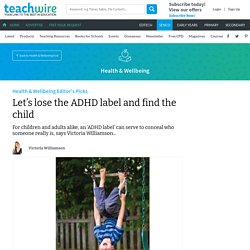

Five essential tips for teaching very young children English. Are you daunted by the prospect of teaching English to very young children? Sheona Gilmour, lead educator on our new online course for teachers and parents, offers a few tips. Teaching English to very young children can be challenging, especially if you haven't done any training for the early years classroom. The first time I walked into a kindergarten, I didn’t want to go back the next day.
I came from a background of teaching older children, who sat at desks and whose attention I could hold more easily. So the new environment, full of young children with much shorter attention spans, felt overwhelming. But if you take on board a few essentials, there's a good chance you'll end up cherishing the experience. 1. It is vital to get the approach right for children of this age. You need to understand what to expect from the children and make sure that what you do in class reflects where they are in their development. 2. 3. Make sure you encourage children so they feel confident. 4. 5. Useful comments and conversations February March 2020.
Building on what children know (free article) - Early Childhood Australia. ‘Take the child on from where they are now’ has long been a slogan in early childhood, but I wonder, as educators, if we always do it? My four-year-old granddaughter, Mia, is extremely capable with modern technologies; she can use a mobile phone and digital camera and browse a DVD to select particular scenes in a movie. She is not ‘print literate’, but she is ‘techno-literate’.
I’m not advocating techno-skills for babies, but I am conscious that this competence may not be valued as she goes into preschool. She may well be told ‘that’s ok at home, but we do things differently here’. My second granddaughter, Maddie, when aged five, entered Prep and, when I asked what she was learning ‘at big school’, she said: ‘We do an awful lot of counting’. My concern is not just that the Prep curriculum is narrow; it’s that the fundamental premise of recognising and building on children’s existing concepts, skills and understandings was not part of the pedagogical mindset at school entry. Assessment for learning.
Observation, Assessment and Planning - Early Years Matters. The EYFS Profile summarises and describes children’s attainment at the end of the EYFS. It is based on on-going observation and assessment in the three prime and four specific areas of learning, and the three learning characteristics, set out below: The prime areas of learning: • communication and language • physical development • personal, social and emotional development The specific areas of learning: • literacy • mathematics • understanding the world • expressive arts and design The learning characteristics: • playing and exploring • active learning • creating and thinking critically A completed EYFS Profile consists of 20 items of information: the attainment of each child is assessed in relation to each of the 17 Early Learning Goals descriptors, (ELGs) together with a short narrative describing the child’s ways of learning expressed in terms of the three characteristics of learning.
The primary uses of EYFS Profile data which have informed the development of the Profile are as follows. Continuum. Information sheet Guidelines for documenting children s learning. Further reading. Pre-birth to Three: Observation, Assessment and Planning. Let’s lose the ADHD label and find the child. When I trained as a primary school teacher 15 years ago, these were some of the words used to describe children with ADHD: ‘Difficult.’

‘Challenging.’ ‘Disruptive.’ There were others, whispered by harassed-looking teachers in the staffroom or concerned parents at the school gates, but none seemed to be positive. When I got my first ‘real’ class to teach, and saw that some of the children came with the dreaded ‘ADHD’ label attached, I approached the new term with butterflies the size of dragons in my stomach. But here’s what it took me a few more years to learn… Michael wasn’t ‘difficult’ He struggled with impulsiveness, often shouting out in class, talking over other children and getting into arguments during games when he found it hard to wait his turn. Valid assessments. Observation, assesment and planning cycle. Quote.